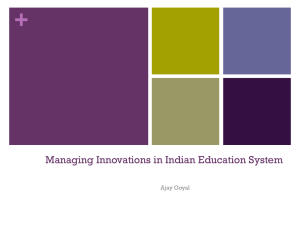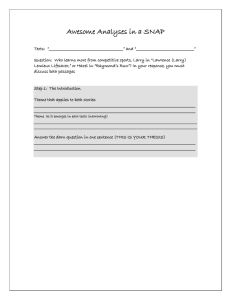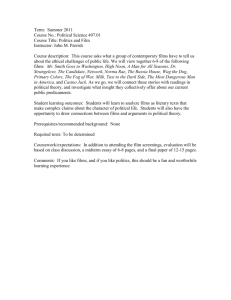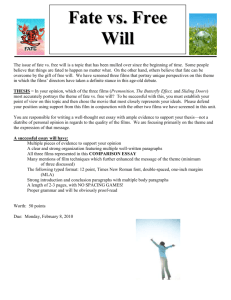Personality Development
advertisement
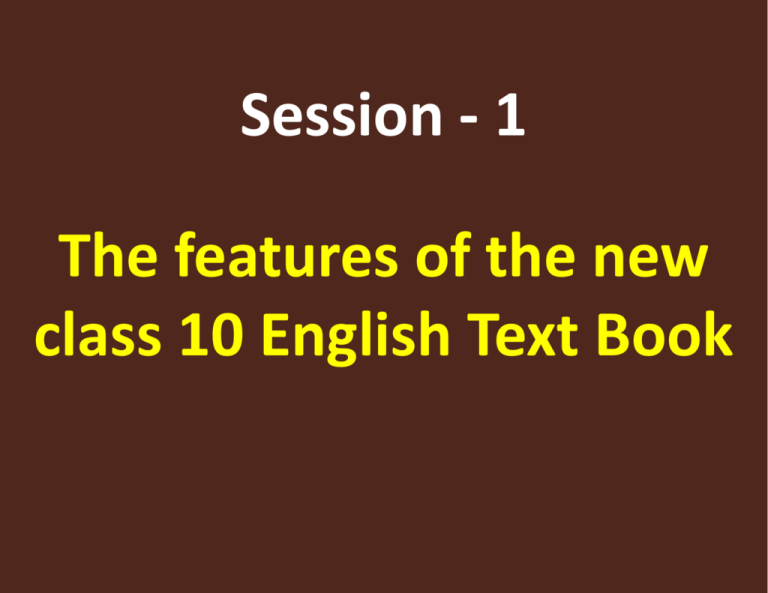
Session - 1 The features of the new class 10 English Text Book 1. Unit-wise themes 1. Personality Development 2. Wit and Humour 3. Human Relations 4. Films and Theatre 5. Social Issues 6. Bio- diversity 7. Nation and Diversity 8. Human Rights 2. Unit Structure 1. Theme –based Picture interaction 2. Reading texts-A,B&C 3. Vocabulary 4. Grammar 5. Listening & Oral Activity 6. Writing (written discourse) 7. Study skills 8. Project Personality Development 1. Picture Interaction- interaction on differently- abled persons 2. A. Reading- Attitude is Altitude 3. Vocabulary-Adjectives (describing) 4. Grammar- Defining defining Relative and Non- Personality Development (Contd..) 5. Writing- writing biographical sketch 6. B. Reading- every Success Story is also a Story of Great Failures 7. Study Skills- identifying features of a short story 8. Listening to a story & making a short speech Personality Development (Contd..) 9. C. Reading-I Will Do It 10. Vocabulary- one word substitutes 11.Project-women who have excelled in their life despite hurdles in their lives and remain unknown to the world 12.Check your personality 13.Self Assessment Other features 1. All the components are thematically linked. 2. Grammar and vocabulary are contextually embedded. 3. Variety of genres in reading texts such as story, biography, essay, drama, poem, review, interview, feature article etc. Other features (Contd..) 4. The texts are taken from different contextsIndian, Eastern, Western and Africa. 5. Integration of all the skills such as listening, speaking, reading , writing in production of language. The paradigm shift in English curriculum • The development of text Books • The Approach to language and language learning. • The Academic standards. • The Classroom process. The paradigm shift in English curriculum (Contd..) • The Assessment. • The role of the teacher, learner and the Text Books. • The aspirations and expectations of the people. What to achieve? The broad areas of the Academic Standards: 1. Listening and Responding 2. Reading comprehension 3. Conventions of writing 4. Vocabulary 5. Grammatical awareness 6. Creative expressions (Oral and Written discourses) How do we realise the academic standards? Class-wise targeted discourses Sl.No Details of the Discourses 1. Conversations 2. Descriptions Songs /poems Narratives/Story Diary Letter Notice/Poster/Ads/Invitation 3. 4. 5. 6. 7. 8. 9 10. Messages/e mail/SMS Slogans /Placards Play/Skit I II III IV V VI VII VIII IX X Sl.No 11 Details of the Discourses I II III IV V VI VII VIII IX X Compering 12. Choreography 13. Essay (All types) 14. Report News Report 15. Speech 16. Review 17. Debate & discussion 18. Biographical sketches/ Profile/Autobiography 19. Interviews 13 Biographical Sketch/Profile/Autobiography • Details of the person • Presentation of relevant ideas and information • Organization of the data • Interpretation of data and drawing inference • Reflections, thoughts and feelings • Anecdotes, events, achievements • Point of view • Organisation and the use of Cohesive devices • Maintaining coherence and flow. Debates and Discussions • Expression of ideas as main points and sub points • Presentation of arguments in a sequential order • Citing suitable examples, quotations, and evidences • Defending one’s own point of view and rebutting opponent’s point of view • Use of discourse markers for agreeing, disagreeing, substantiating, enumerating, etc.. • Use of polite expressions respecting other’s views • Use of logical and emotional appeals. Essay (All types) • Title, introduction, thesis statement, body and conclusion • Paragraphing with main ideas • Supporting details and examples • Organization of ideas and use of cohesive devices • Maintaining coherence • Point of view. Speech • Making speeches/ Organisation of ideas. talks contextually • Use of argumentative/ Persuasive/ interactive language to substantiate views and ideas. • Use of discourse markers. • Citation examples, quotations etc. • Coherence, voice modulation and body language. About the Textbook and Themes What is a theme? Theme is the central idea of a piece of writing. Themes in the text book • Each unit is woven around a theme. • The themes are selected from the important spheres of social life of the child. • They help the child use the worldly knowledge and appropriate context for learning and producing language. Unit 1: Personality Development • Theme – Personality development • A Reading – Attitude is Altitude • B. Reading – Every Success Story is also a Story of Great Failures • C. Reading- I will Do It Personality Development (Contd… • This unit helps people understand themselves- and their strengths and weaknesses- and to form right attitude towards the life, society, career and so on. • The individual who has right attitude towards problems will always accept them courageously and tries to find solutions from the constructive side. Unit 2: Wit and Humour • Wit is the ability to say or write things that are both clever and amusing. Sometimes it is found in offering solutions to tricky problems. India has abundant literature on wit. Wit and Humour (Contd..) • These stories develop sound logic, a deep sense of humour which go a long way in making the life of people more harmonious. They also develop philosophical insights into different social questions. The present unit brings to us two valuable pieces- a one act play and a short story. Unit 3: Human Relations • The children have some dreams about their future. The adults have some priorities like getting a good job, living in comfortable house, etc • But none of these physical comforts gives us the feeling that warm relation with people living around us gives. Nowadays , the elderly people have feeling that they not wanted by anybody. Unit 4: Films and Theatre • ‘Films and Theatre’ is considered to be the most popular entertainment media. • India has a100 year history of films. • This unit helps the children review the films and appreciate the art of film making. • Films have become part and parcel of our lives. They provide us opportunity to explore possibilities to make use of the films to generate language. Unit 5: Social Issues • Students in class 10 should have a critical perspective on different social issues and should be able to take up leadership roles to bring about the awakening of India. Unit 6: Bio- diversity • The theme is more relevant than ever in the wake of sweeping changes taking place in different spheres across the world. • The process of development has assumed a new dimension in the recent times. Bio- diversity (Contd..) • It has been a direct attack on the biodiversity and large scale exploitation of resources for private profits. • This unit sensitises the children about their responsibilities towards the nature Unit 7: Nation and Diversity • India is a land of diversity. • The diversity is so much that many people across the world wonder how this land is able to remain intact till now. • Even the British, as a matter of strategy, expressed doubts about the unity of the nation if given independence. • After independence, there have been difficult times. But the nation withstood. Unit 8: Human Rights • It is the century that sent man to the • moon. Still …there was a strong demand for the protection human beings against all kinds of exploitation and oppression. • The learners of this century need to internalize the spirit of human rights to uphold humanity. • The three texts are really touching and apt to the theme. Make These Things a Part of Your Preparation Teachers are advised to know certain information regarding the texts given under each theme. As the entire teaching-learning process will go through interaction and discussion, the teacher has to pose a number of questions to students to give certain inputs to get responses. And learners out of their curiosity, may ask several questions on the content or various aspects given in the texts. Make These Things a Part of Your Preparation (Contd..) As a facilitator, the teacher has to answer the questions of the learners. For this the teacher has to take care of the following before going to start teaching or transacting a unit. Make the following a part of your preparation as well as your general preparation. • Using Video Information. • Collecting vocabulary. additional list of • Writing: collection of model pieces, make children analyse the features.
